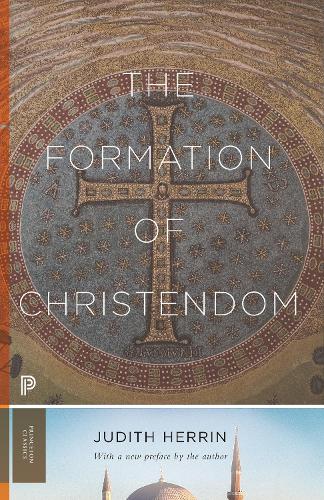
The Formation of Christendom
(Paperback, New edition)
Publishing Details
The Formation of Christendom
By (Author) Judith Herrin
Princeton University Press
Princeton University Press
1st February 2022
New edition
United States
Classifications
General
Non Fiction
Christianity
History of religion
270.2
Physical Properties
Paperback
568
Width 140mm, Height 216mm
Description
A groundbreaking history of how the Christian 'West' emerged from the ancient Mediterranean world.
In this acclaimed history of Early Christendom, Judith Herrin shows how from the sack of Rome in 410 to the coronation of Charlemagne in 800 the Christian 'West' grew out of an ancient Mediterranean world divided between the Roman west, the Byzantine east, and the Muslim south. Demonstrating that religion was the periods defining force, she reveals how the clash over graven images, banned by Islam, both provoked iconoclasm in Constantinople and generated a distinct western commitment to Christian pictorial narrative. In a new preface, Herrin discusses the books origins, reception, and influence.
'A serious and powerful book...A grand synthesis on a scale few people would dare now to attempt, ranging across diverse societies with considerable assurance.' Christopher J. Wickham, International History Review
'A brilliant overview of how the legacy of the Roman empire continued to shape the Mediterranean world.' Rowan Williams, New Humanist
'It will no longer be possible to hop from pagan antiquity to Carolingian Europe as if nothing had happened in between. Judith Herrin has laid her sheet of paper over the map of that 'dark' age and rubbed and rubbed until the rich web of connections and cracks has shown through.' Marina Warner, The Independent
'An ambitious, learned, lucid, and instructive book.' Alexander Murray, Times Literary Supplement
Reviews
"A brilliant overview of how the legacy of the Roman empire continued to shape the Mediterranean world."---Rowan Williams, New Humanist
"Herrins Christendom is an obvious candidate for the Princeton Classics series. Here one can savour the clarity and originality of her account of such dauntingly named theological upheavals as the Monothelite controversy (over the psychology of Christs divinity versus his humanity) of the seventh century, or the struggles over the use of icons in Christian worship that came close to ripping the Byzantine empire apart in the eighth and ninth."---Diarmaid MacCulloch, Times Literary Supplement
"It will no longer be possible to hop from pagan antiquity to Carolingian Europe as if nothing had happened in between. Judith Herrin has laid her sheet of paper over the map of that 'dark' age and rubbed and rubbed until the rich web of connections and cracks has shown through."---Marina Warner, The Independent
"An ambitious, learned, lucid, and instructive book."---Alexander Murray, Times Literary Supplement
"Herrin's scholarship is unerring, her scope is wide and her style fluent. . . . The treatment of the so-called iconoclastic controversy, the dispute over the veneration of images in Christian worship which convulsed the Byzantine world in the eighth century, is sparkling. . . . Debate about where modern Europe came from . . . will be enriched by this civilized and accomplished book." * The Economist *
"Herrin follows some magnificent themes with the lucid dispassion of a good detective."---Thomas D'Evelyn, Christian Science Monitor
"It is [the] binding together of distant past and immediate present which makes Judith Herrin's scholarship so exciting: she can convince the reader that the roots of Western distinctiveness really do lead all the way to forgotten episcopal meetings in small towns in Asia Minor in the fourth century."---Michael Ignatieff, The Observer
"A learned, challenging, and gracefully written interpretation of the transition from antiquity to the Middle Ages."---Robert L. Wilken, Commonweal
"A serious and powerful book. . . . A grand synthesis on a scale few people would dare now to attempt, ranging across diverse societies with considerable assurance."---Christopher J. Wickham, International History Review
Author Bio
Judith Herrin is professor emeritus in the Department of Classics at Kings College London. Her books include Ravenna: Capital of Empire, Crucible of Europe; Byzantium: The Surprising Life of a Medieval Empire; Unrivalled Influence: Women and Empire in Byzantium; Margins and Metropolis: Authority across the Byzantine Empire; and Women in Purple: Rulers of Medieval Byzantium (all Princeton). She lives in Oxford, England.
